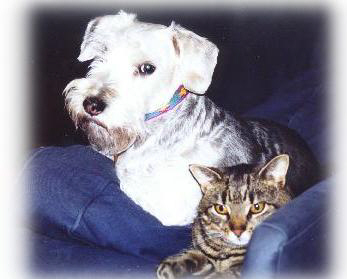Form Follows FunctionWhen
evaluating any representative of a breed of dog, it is important to take into
consideration the function for which that breed was developed. A Breed Standard
is not arbitrary. There are important reasons for many of the characteristics
detailed in the standard. From physical characteristics to how a dog is groomed,
form can and does impact how well a dog fulfills it's intended role.
| Instructions:
Read this section, which details
some of the key functions of the Cesky Terrier, and the ways in which the
standard reflects these functions.
Remember that all dog breeds
developed with a specific function in mind, from herding to companionship,
and desirable characteristics were set to accommodate this intended
function. Part of evaluating any dog breed must be to
determine how well it is suited to perform the tasks for which it was
bred.
|
| Temperament
Characteristic: The Cesky is more amenable
to other dogs and to training than many other terriers.
|
 |
Reason: Cesky Terriers were
developed to hunt in groups. Therefore a less aggressive temperament with other
dogs is required. Because they were developed to hunt with humans in the
field (as opposed to ridding barns of rodents on their own), a more trainable
and less independent temperament was needed. The ideal Cesky should be
responsive and obedient, while still retaining the "gameness" a
terrier requires to go to ground after it's quarry.
Note that it is these same traits that
also make the Cesky a wonderful and amusing companion that generally gets along
well with children and other pets.
Grooming
Characteristic: The Cesky Terrier is clipped with
clippers, never hand stripped. Hair is left long on the face (beard and
moustache) and a fall of hair covers the eyes.
Reason: The Cesky was bred to go
into burrows after game. The facial hair, especially the hair over the eyes,
protects the face and eyes from sharp objects and bites or scratches from it's
quarry. The Cesky was also meant to be an "easy keeper." As a working
field dog who gets down and dirty, Mr. Horak wanted the Cesky to be as easy to
groom as possible. Clipping is much less time consuming than hand stripping.
Ears
Characteristic: The Cesky has medium-size drop ears
that cover the ear opening.
Reason: Like the fall of hair over
the eyes, the drop ears help protect the ear canals from dirt or injury.
Chest
Characteristic: The chest circumference should not
exceed 19 3/4 inches -- smaller is better. The chest is more cylindrical than
deep.
Reason: The Cesky was specifically
bred to fit in holes that were too small for either of the parent breeds (Scotty
and Sealyham). In order to accomplish this, keeping the chest circumference
smaller and the chest not overly deep was a key concern. Although out of
context it may seem arbitrary, remember that this was one of the primary reasons
the breed was developed, and consequently it is a very significant trait.
Forelegs and Elbows
Characteristic: The forelegs should be straight,
well boned and parallel. The shoulders are well muscled. The elbows
are alongside the body, not under. Elbows are loose but should not turn in
or out. Front feet are larger than back feed and nails are strong.
Pads are well developed.
Reason: The Cesky was bred to DIG,
DIG, DIG!! The position of the elbows and straight front legs allow the
legs to move freely in a digging motion. To illustrate this, try holding
your own elbows loosely against your sides. Your forearms are free to move
forward and back alongside your body. Now place your elbows against your
ribs slightly in front of your body. Note that the range of movement of
your forearms is far less.
The strong nails, larger feet and well
developed pads provide durability and surface area to facilitate digging as
well. And the well muscled shoulders provide strength and endurance for
prolonged digging. |